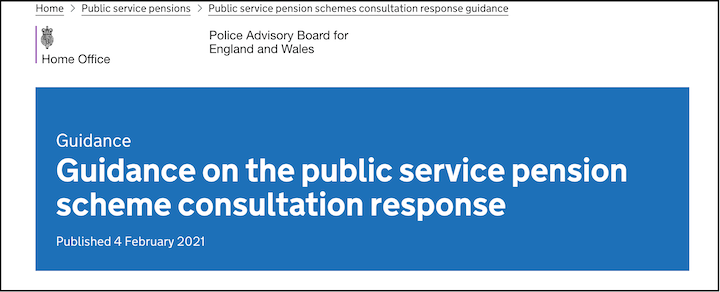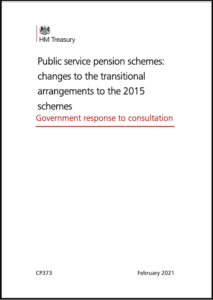 The government’s consultation on LGPS, Catherine McFadyen argues, closes with a decision which avoids forcing members to make choices that could be “financially disadvantageous”. But there is still much work ahead for funds.
The government’s consultation on LGPS, Catherine McFadyen argues, closes with a decision which avoids forcing members to make choices that could be “financially disadvantageous”. But there is still much work ahead for funds.
During the reform of all public sector pension schemes (PSPS) in the first half of the 2010s, the UK government, in a deviation from the Hutton recommendations, agreed to introduce an element of transitional protection into the design of the new schemes. The format of the protections differed between PSPS. However, they were all uniform in applying the eligibility criteria—the protections would only be applicable to members who were:
- active in the scheme as at 31 March 2012
- within 10 years of their normal retirement age as at 1 April 2012.
Things start to get McCloud-y
In 2016-17, members of the Judicial and Firefighters’ Pension Schemes (including one member named McCloud) brought a claim of age discrimination against the Ministry of Justice (MOJ) due to the imposition of the transitional protections. The members contested that, by applying the protections only to those members within 10 years of retirement at March 2012, younger members of the scheme were at a disadvantage.
In July 2019, the legal battle ended when the Supreme Court refused to hear the government’s appeal. Government accepted that the protections put in place were discriminatory and committed to remedying the situation across all PSPS which implemented age-based transitional protections during the reform process.
Choose your umbrella
Over summer 2020, government sought views on proposals to address the unlawful discrimination arising from the transitional protections.
Government received 3,000+ responses to the consultation from interested parties with their views on the key issues. Earlier this month government published its response to the consultation dealing with how it intends to legislate to address the discrimination.
This consultation, and the remainder of this article, deals with the unfunded schemes only.
Due to differences in the way transitional protection was provided in the Local Government Pension Scheme in England and Wales, and the equivalent scheme in Scotland, a separate consultation was published on changes for those schemes.The Ministry of Housing, Communities and Local Government will publish a response to the LGPS (England and Wales) consultation later this year.
Clearing the McClouds
 We are pleased to see that the government has heeded the comments of respondents, including ourselves, who called for members to be allowed to make a benefit choice at retirement (the “deferred choice underpin”, DCU) rather than be forced to make an immediate election based on assumptions (the “immediate Choice underpin”, ICU).
We are pleased to see that the government has heeded the comments of respondents, including ourselves, who called for members to be allowed to make a benefit choice at retirement (the “deferred choice underpin”, DCU) rather than be forced to make an immediate election based on assumptions (the “immediate Choice underpin”, ICU).
The DCU approach provides greater security for members. Government recognised that requiring members to make an immediate choice risked more members, particularly those a long way from retirement, making a choice which ultimately turned out to be financially disadvantageous .
Government, however, ruled out the “anytime choice” option advocated by some respondents, where members could choose the point at which they made the decision about which benefits to take.
Government’s view was that this would be considerably more complex to administer, but more fundamentally would still incur the substantial risk that members make choices which ultimately turn out to be less beneficial.
What does this mean for administrators?
The administration impact of either option is considerable and consultation respondents were split on which would be more difficult to administer. 44% believed the DCU would have a greater administrative impact, vs 34% for ICU; 22% believed both options would have similarly adverse administrative impact.
It is, perhaps, the timing of the administration impact which causes this division. DCU avoids the administrative challenge of carrying out an immediate options exercise for three million members, but scheme administrators will be required to run two parallel sets of benefit design for the next 40 years.
The (eventual) end of the legacy schemes
Some respondents argued that all members should be able to retire in line with the pension arrangements as they were when they entered service, or argued that the new schemes are themselves unfair or discriminatory.
Government, predictably, has not entertained this view, noting that it is only the transition protections which have been found to be discriminatory not the new schemes.
The McCloud remedies therefore will not be extended to members joining PSPS after 31 March 2012, and legacy schemes will be closed in relation to service after 31 March 2022.
What happens now for the unfunded schemes?
There were a number of technical issues raised through the consultation process including abatement and transfers. Government will continue to work with (specific) schemes to address these further, given the complexity of the issues involved.
We now expect government to bring forward primary legislation on the basis set out above, including an implementation timeline extending to 1 October 2023. We can also expect further consultation, for each PSPS, on the detail of any necessary amendments required to scheme regulations. There is much work and detail to be sorted through, but we can eventually start to see the McClouds clearing.
Catherine McFadyen is head of LGPS consulting, Hymans Robertson.
FREE monthly newsletters
Subscribe to Room151 Newsletters
Room151 Linkedin Community
Join here
Monthly Online Treasury Briefing
Sign up here with a .gov.uk email address
Room151 Webinars
Visit the Room151 channel













